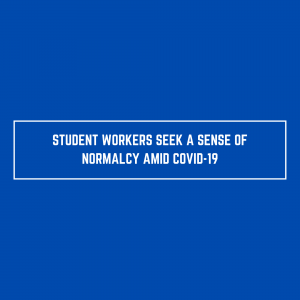Rylie Daniel
Arts & Features Writer
[email protected]
COVID-19 continues to reshape lives, taking away student workers’ financial security and forcing change upon forms of livelihood, said Joe Trimmer, IT service desk assistant at UNC Asheville.
“COVID-19 has ripped me away from my life. I am no longer taking care of myself in Asheville and enjoying the company of my roommates and close friends. I have been forced to move back home to take care of my family,” he said.
Trimmer said he is lucky to still have his job with the campus considering the almost complete shutdown of the school.
“Since we all work online now, my work has been busy, to say the least,” he said.
UNCA’s Payroll Department informed student employees and their supervisors last week regarding eligibility for administrative leave through Mar. 31. According to an email from the department, eligible students can log time they worked on campus and scheduled time in the pay period due to COVID-19 impacts.
Similarly, Garrett Corrado, a resident assistant on campus, finds himself still employed amid the COVID-19 changes.
“I am still an RA and fortunately residence life is still paying us as if we were on campus, but we are obviously not in the residence halls so it’s a lot less interaction with my residents,” he said.
According to Corrado, UNCA has managed to handle the pandemic fairly well considering the progression and pace of COVID-19.
“What people don’t understand is that something of this magnitude has never happened in our lifetimes,” he said. “This is an unprecedented situation, and I think that leaders at UNCA, whether it be the chancellor, or vice chancellor or any one of the phone bank volunteers in Residential Life, they need to know we as students support them.”
Trimmer said he respects how UNCA took the COVID-19 pandemic head-on and sees their response as more timely and effective than the government itself.
“I feel that our university has handled the pandemic better than our nation has to reduce the spread of the virus. I have received more updates from my chancellor than I have from my president and governor,” the 20-year-old said.
Sophomore and Trader Joe’s employee Ceci Attwood said UNCA’s early efforts were not supportive of everyone and caused frustration when it came to planning what she could do next.
“The fact that they initially were only announcing that class was going to be online in two week increments made it very difficult to formulate a plan with my family and bosses on if I would have to move home and if I would have to transfer job locations,” she said.
Attwood said situations have improved since classes have resumed and communication between professors provided an abundance of clarification.
According to Trimmer, his experience with professors has been similar, but the struggle of online classes still weighs heavily on his mind.
“I’m afraid that a lot of students will suffer this semester and they will be thrown off their academic course,” he said. “I truly hope that our university embraces this discourse and uses it as a chance to show their students that they care about their wellbeing and future, not just the tuition checks we provide.”
Trimmer said his biggest concern falls on people not taking the virus seriously and in-turn harming the community around them and the population as a whole.
“It’s a group effort to flatten the bell curve and we all have to do our part. Sometimes, it feels like I’m in the first grade getting my recess taken away because someone won’t stop disrupting class,” he said.
Attwood said her concerns mainly revolve around her place of work when dealing with COVID-19.
“Stores now have shortened hours, only take in fifty customers at a time and many other changes that vary store to store,” she said. “In Asheville, we had crew members constantly tasked with sanitizing carts, baskets, surfaces and registers. We also had to respect the 3- to 6- foot rule as we moved throughout the store, unloaded products and interacted with customers.”
According to Attwood, working in a grocery store during this pandemic increases her anxiety.
“I found that after returning home, showering, washing my clothes and sanitizing everything in my backpack, the anxiety would hit pretty instantly and I would easily obsess over if I had potentially been exposed to anything, or in the worst case, exposed someone else to anything,” the 20-year-old said.
Trimmer said sanitization worries his mind often as he now lives at home with his parents.
“As a healthy young person with no preexisting health conditions it’s my duty to be the one to go out in public, sanitize common areas at night once everyone has gone to sleep,” he said. “I knew that one day our roles would switch, but for it to happen 15 years early shakes me to my core. It’s alright though because I love them and if that’s what the right thing to do is, then I won’t hesitate to get it done.”
Trimmer said this pandemic ranks as one of the biggest tests citizens have faced in years and relies on group effort for any kind of return to normalcy.
“It comes down to our own ability to isolate ourselves and serve our communities passively. Now is the time to stray from selfishness and adapt selflessness” he said.
Categories:
Student workers seek a sense of normalcy amid COVID-19
March 29, 2020
0
More to Discover

















